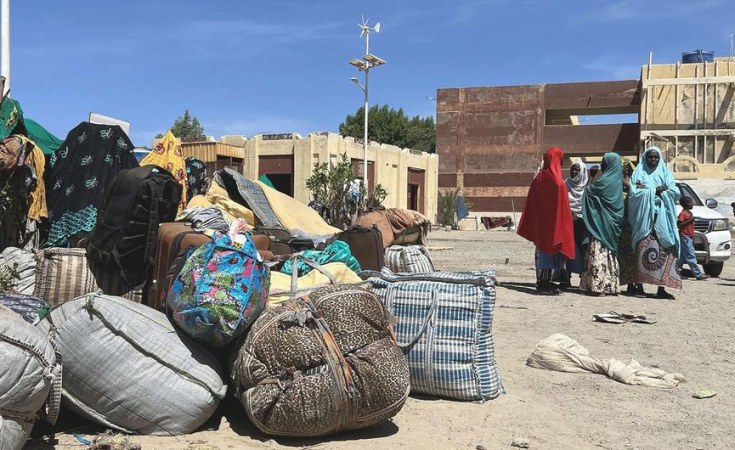Fighting eased in Sudan this week as a week-long humanitarian ceasefire allowed civilians to venture out. Yet for displaced people and refugees, humanitarian groups report a catastrophic situation.
Sporadic fighting has spread from the capital Khartoum to other parts of Sudan, with humanitarian work becoming increasingly difficult.
The International Organisation for Migration says battles have displaced more than a million people inside Sudan, with a further 319,000 people seeking refuge over the border in Egypt, South Sudan and Chad.
At the Chadian border, the UN's refugee agency, the UNHCR, reported that the number of refugees arriving in Chad from Sudan had now surpassed 90,000.
Refugee influx
Agency spokeswoman Eujin Byun, who worked at the border for 10 days, told RFI that Chad had received 27,000 new refugees from Sudan in less than a week.
New refugee needed to be urgently moved to safer camps further from the border, Brun said, adding this was made difficult by the fact most refugees were women and children awaiting other family members.
"There is still fighting near the border; we need to relocate the refugees because of insecurity," Byun said. "We have 13 existing camps inside of Chad, and they are better equipped."
She also recalled that before the conflict erupted, Chad was already hosting 600,000 refugees, including 400,000 Sudanese from western Darfur.
Newly arrived families from #Soudan are relocating to Gaga camp (eastern #Chad🇹🇩) - 130 kilometers away from the border. Upon arrival, they receive a newly built and separate family shelter and can now access education and health care services. pic.twitter.com/UKfg90W5cM-- UNHCR West & Central Africa (@UNHCRWestAfrica) May 23, 2023
Humanitarian aid at risk
The NGO Doctors Without Borders (MSF) also denounced what it called the "unacceptable harassment" of its staff and the "violent looting and occupation" of its medical premises and supported facilities in Sudan.
"We are experiencing a violation of humanitarian principles and the space for humanitarians to work is shrinking on a scale I've rarely seen before," said Jean-Nicolas Armstrong Dangelser, MSF's emergency coordinator in Sudan.
Staff and patients were repeatedly facing the trauma of armed groups entering and looting MSF premises with medicines, supplies and vehicles being stolen all over the country, Dangelser added.
MSF, which runs projects in 10 states across Sudan, has been trying to scale up its activities since intense fighting broke out between the Sudanese military and the Rapid Support Forces on 15 April.
These efforts have been continually hampered by violence, armed incursions, looting and logistical challenges.
"This shocking disregard for humanitarian principles and international humanitarian law has impeded our ability to provide healthcare to people at a time when it is desperately needed," Dangelser said.
UN warehouses had been repeatedly attacked and looted, the UN's humanitarian coordinator in Sudan, Abdou Dieng, told RFI.
"We found the fridges unplugged and open with medicine that needed to be under controlled temperatures left completely unusable," he said.
Dieng called on those on both sides of the fighting to respect their commitment to humanitarian workers.
Conflict in sixth week
Sudan has endured more than five weeks of fighting that has claimed more than 1,800 lives, figures released Wednesday by the Armed Conflict Location and Event Data Project show.
Violence between rival Sudanese forces also broke out in the western region of Darfur.
The conflict erupted after Sudan's de facto leader, General Abdel Fattah al-Burhan, clashed with his former deputy, RSF commander Mohamed Hamdan Daglo.
Burhan and Daglo had in 2021 staged a coup that unseated a civilian transitional government but later fell out in a bitter power struggle.


